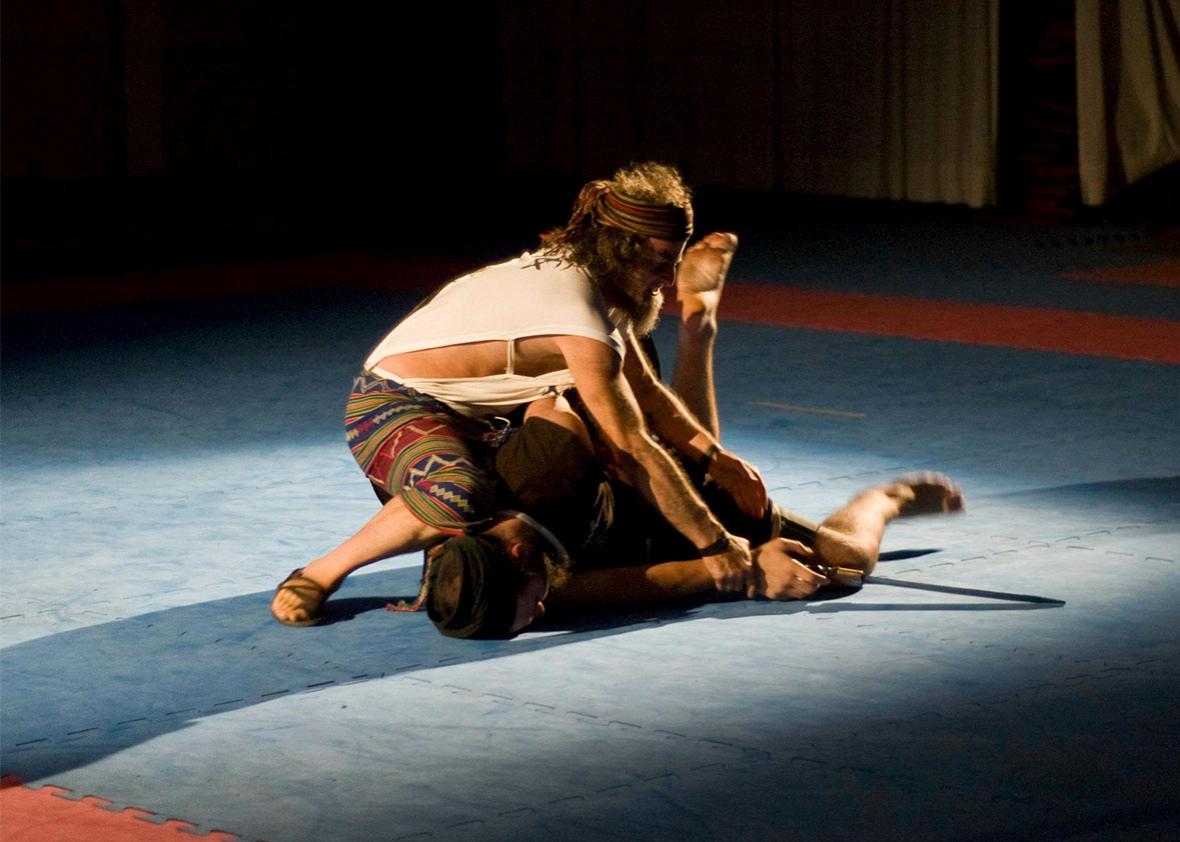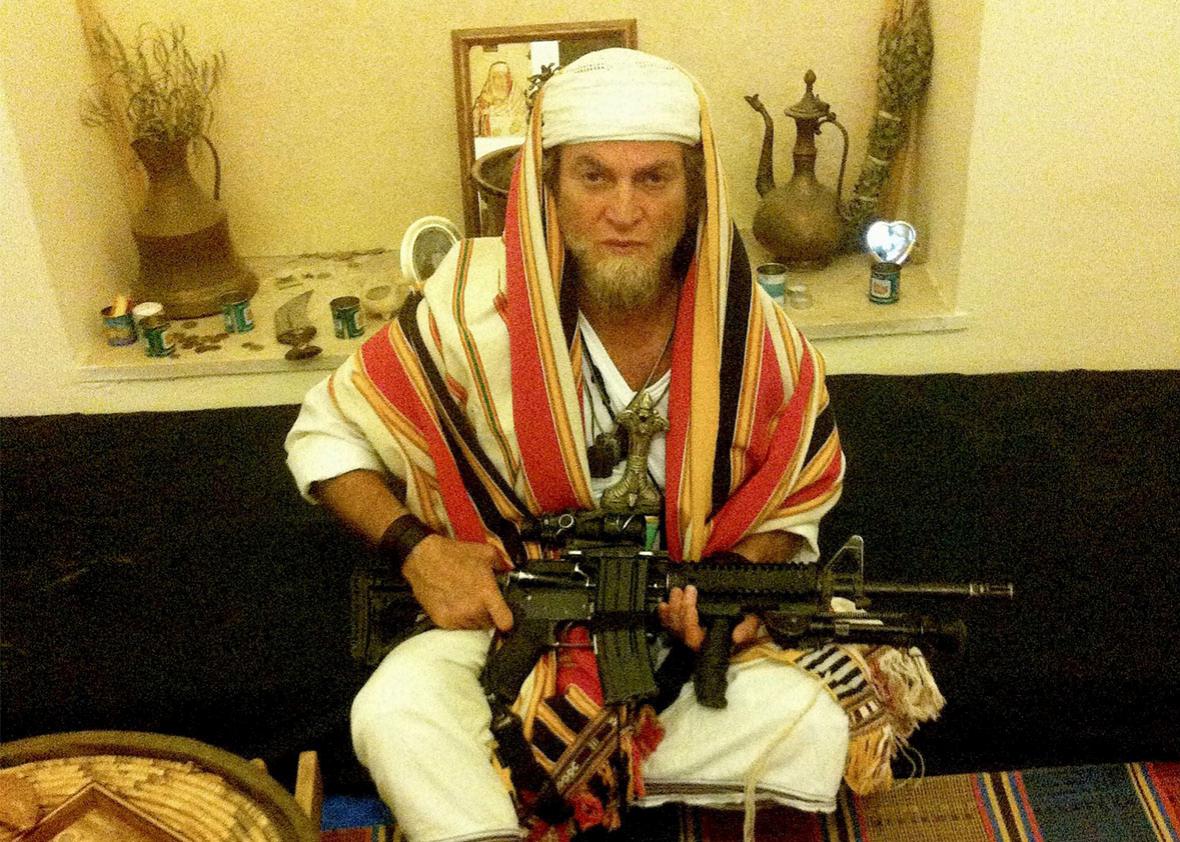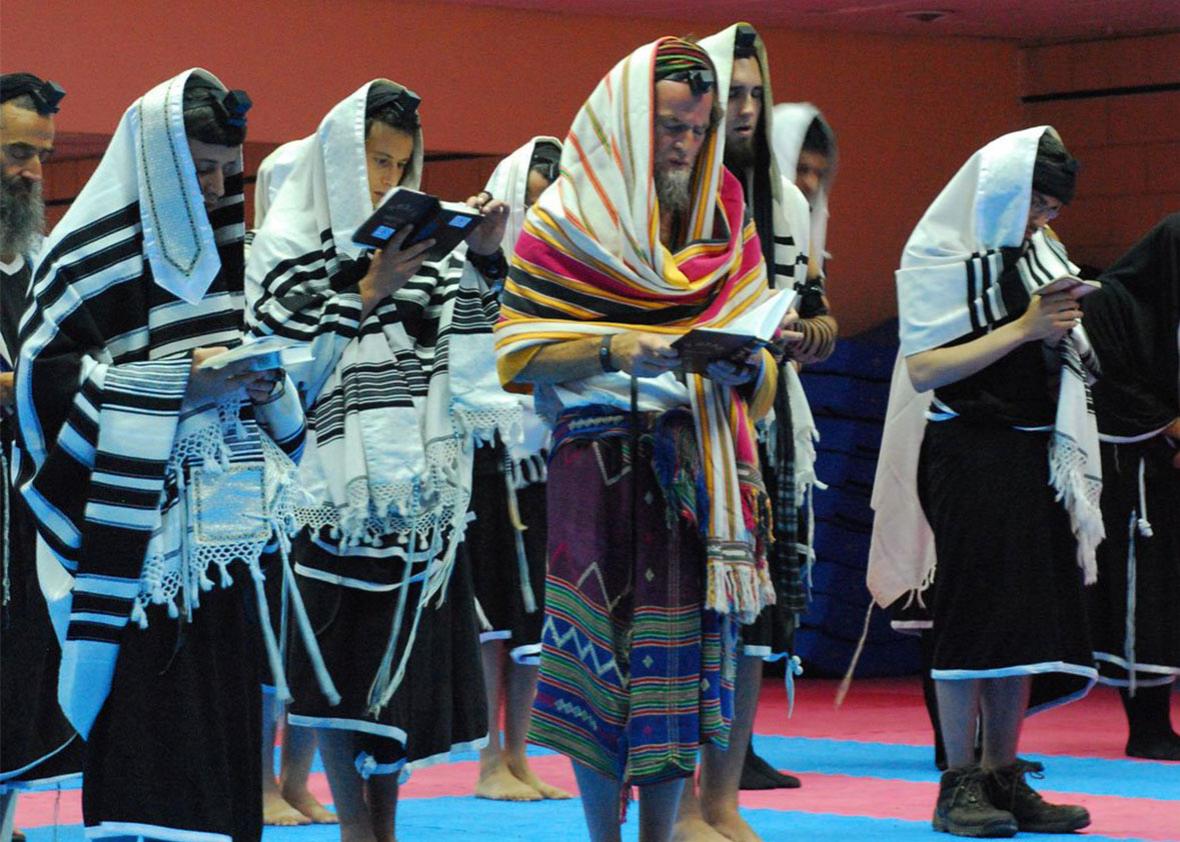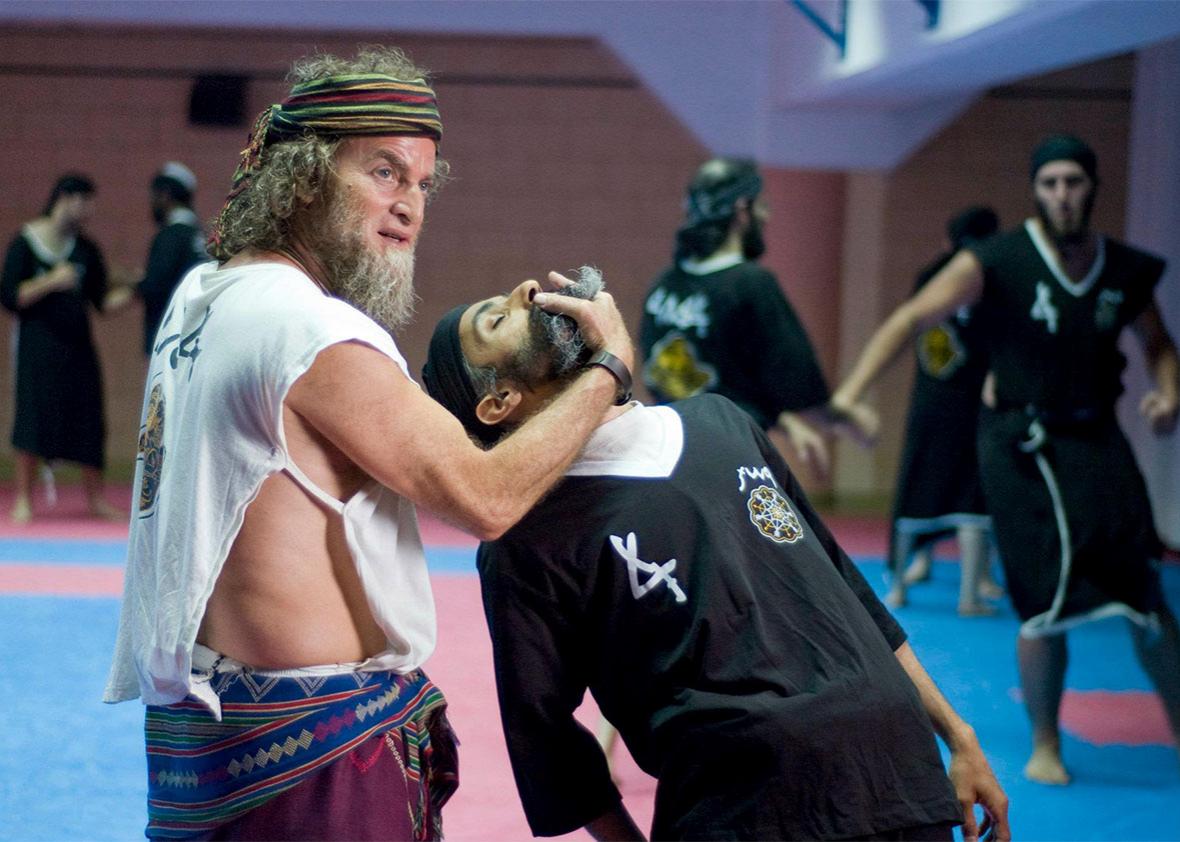Each week, Roads & Kingdoms and Slate publish a new dispatch from around the globe. For more foreign correspondence mixed with food, war, travel, and photography, visit their online magazine or follow @roadskingdoms on Twitter.
This article was originally published in the Times of Israel.
JERUSAELM—In a network of rooms underneath Jerusalem’s Teddy Stadium, a variety of martial arts classes thrive. Advertisements adorn the walls for everything from Korean tae kwon do to the Brazilian dance-fighting capoeira. Among the familiar disciplines, though, there is also a practice unique to Jerusalem, a Hebrew martial art called “Abir Qesheth,” which aspires to build young men into modern-day biblical warriors.
The head practitioner of Abir Qesheth is Yehoshua Sofer, an extraordinary character who claims to be the sole teacher of an ancient Hebrew martial art that was practiced by King David himself and secretly preserved for centuries by Yemenite-Jewish warriors.
Classes of around 10 students are held twice a week at 8 p.m. The classroom-gym is equipped with only a mat lining the floor and a few punching bags in the corner. As they trickle in from the stadium parking lot, the students prove to be mostly religious young men, many of them from the United States or children of U.S. immigrants, some with scruffy beards and payot (Jewish side curls). Unlike the typical white suits of martial arts, their uniform is black and decorated with Aramaic writing, with a black head wrap.
Practice begins with kicking and punching drills, beards and payot jumping with each kick and punch. The warmup ends with the students rhythmically chanting in unison the Hebrew letters that spell Abir—“Aleph, bet, yud, reish.”
Sofer strides into the gym, white head wrap confining his dreadlocks, white robe flowing, leather sandals peaking out from beneath.
Sofer says he is the world’s only “Aluf Abir,” or grandmaster of Abir, a title he claims to have inherited from his father in an ancient Hebrew-Yemenite warrior tradition. According to Sofer, his ancestors in Yemen were Jewish warriors who worked as security guards for Saudi kings and Ethiopian royalty. Yet Abir Qesheth was practiced in secret due to fears of anti-Semitism. Only in the past decade has Sofer been granted permission from his father to transmit the fighting system, he says. Now Sofer is the sole person responsible to “preserve the Abir tradition” and “create whatever new protocols, guidelines, parameters, and boundaries are necessary to ensure the Abir organization continues to function.”
Whatever the veracity of such claims, Sofer certainly looks the part of an ancient Hebrew warrior and refers to himself as a “high-tech desert nomad, walking right out of a page in the Torah.”

Photo courtesy of Abir-Qesheth Hebrew Warrior Arts
Eyebrows arching and nostrils flaring with exertion and passion, he makes for a charismatic instructor, with a coaching style that involves standard martial arts instructions, interwoven with Judaic teachings and pauses for personal, grandiose stories of training with martial arts movie stars Chuck Norris and Bruce Lee in Los Angeles.
There is no specific mention of a Judaic martial art in the Bible, but Sofer claims inspiration from the biblical word qesheth for “bow.” And it is the discipline’s “looping and bowlike movements,” he says, that make Abir Qesheth unique.
“People will criticize, saying that Abir is just an Asian martial art in disguise. That’s not true,” he insists. For example, “in Abir we never lock our limbs like other disciplines.”
Abir practitioners use an “Aleph-Bet fighting system” that incorporates Hebrew and Aramaic letters into their movements, he adds. In the course of the class, underlining the point, one student asks, “What do I do if I’m attacked with an elbow?” Sofer responds in his distinctive Yemenite-Hebrew accent, “You strike him from the top, with your wrist forming a [Hebrew letter] vav.” To practice Abir Qesheth, he says later, “you must embody the Torah through your actions.”
An hour into the session, with the room full of twirling black—bar one student who is wearing pajama bottoms—Sofer takes a break and walks over to me. He points to a scruffy-looking boy wrestling in the corner. “You see this kid, he is from New York, a yeshiva boy. Now he’s dangerous, and I’m happy he’s dangerous.”
Judaism has become “emasculated,” he asserts, elaborating that he sees Abir Qesheth as not just a martial arts system but also as a way of casting off Westernized “diaspora” forms of Judaism and reincarnating the warriors of ancient Israel.
One of the students, who gives his name as Gershon, endorses the goal. “Jews are idol smashers,” he says. “We are meant to spread and defend truth.”
According to the Abir website, what’s being taught is far more than a martial art. Students learn how to use traditional weaponry but also circumcision techniques, animal husbandry, and ritual bath construction, though there is no evidence of any of this at the Teddy session. “Abir is holistic. It’s about serving God with your entire being,” Sofer says. Ultimately, Abir practitioners “must completely submit to the will of the God of Israel” and become “instruments of God.”

Photo courtesy of Abir-Qesheth Hebrew Warrior Arts
Sofer, who is in his mid-50s, is patently a dedicated and skilled martial artist. His Wikipedia page claims that he studied Korean martial arts as a child and had a black belt by age 10. His movements are flowing and graceful, and the Abir system is full of intricate complexities. Sofer has a martial arts instructor certification from the Wingate Institute, Israel’s national center for physical education and sport. (Wingate does not certify any martial art as authentic.)
Yet there’s a great deal more to his story. Sofer was born into a Breslov Hasidic family in Jamaica—where, he once said, his father was an ombudsman for aluminium and bauxite workers. It was a Chinese man he ran into in Kingston, he once said, who introduced him to martial arts (though that hardly squares with the family warrior tradition he now claims). The family then moved to Los Angeles, where he lived before moving to Israel.
Here, he became known as a pioneering rap musician, even regarded by some as a father of Israeli hip-hop. In 1993, Sofer produced an Israeli rap album under the name “Nigel Ha’Admor” (Nigel the teacher), including the song “Hummus Makes You Stupid,” a cult hit that pioneered a genre called “ragamuffin.”
According to entertainer, musician, and TV host Yair Nitzani, who worked with Sofer on the album and owns the record label that produced it, Sofer “had an amazing style. His rap was different and was cool. It was the first of its kind in Israel and influenced many Israeli hip-hop artists like Hadag Nahash, Subliminal, and Shabak Samech.”
In a clip on YouTube, Sofer can be seen performing his Hummus song on Israeli TV, sporting a short haircut and fluorescent pink suit and speaking in Jamaican-accented Hebrew. Quite the contrast with his current image.
According to Nitzani, Sofer “wasn’t fluent in Hebrew,” but “he had an amazing command of street-level Hebrew and music.” Through rap, he “was able to invent a new Hebrew.”
Nitzani said he knew Sofer “was a very serious martial artist, but I never heard of anything called ‘Abir’ until recently.”
Asked about his Jamaican origins and the rap years, Sofer is reticent and hard to pin down. “We do not choose where we are born. I don’t like to confuse people with the Jamaican chapter, aspect, of my life,” he says, then adds impenetrably: “It almost always confuses my Nazirite vow and locks with a Jamaican cult that is built upon usurping my ancient roots.” (The word Nazirite refers to a person who voluntarily takes a biblically rooted vow requiring him or her to refrain from certain acts, including cuttings one’s hair and drinking alcohol.)
Those of Sofer’s students who know of his reggae-rap history evidently have no problem with it. According to Gershon, “the Abir grew up poor and learning to fight in the streets; hip hop is just a part of that.”
Plainly, he’s still got the entertainment industry in his system, however. Sofer says he’s planning to utilize his mixture of artistic and martial arts skills toward producing “biblical action films.” The theme: to upend the “weak Jew” stereotypes he believes are perpetuated by Hollywood,and produce films with ancient Hebrew dialogue that bring to the big screen “the Torah’s classical stories of heroes who were righteous proponents of the Abir Qesheth system.”

Photo courtesy of Abir-Qesheth Hebrew Warrior Arts
Sofer and his students are aware that some view Abir Qesheth as more of a laughing matter than a serious martial art. Some instructors of other martial arts classes at the stadium hold back giggles when asked about it; the satirical Israeli television show Eretz Nehederet once aired a demeaning parody of Abir.
But Sofer’s students show a steadfast commitment and shrug off negative opinions of their discipline or their teacher.
Sofer tells vibrant and verbose stories of living in Yemen, training as a child with Hong Kong martial arts superstar Lee, or being a bodyguard for supermodel Naomi Campbell, that seem hard to reconcile with what he has previously said of his childhood.
But these students at Teddy plainly respect and accept him as the last living grandmaster of Abir. And they seek his guidance not just in martial arts but also on matters ranging from Judaism to politics.
Today’s class, like every Abir session, ends with Hebrew prayer. In a guttural Yeminite accent, Sofer leads the rest of the students. There is much kneeling and bowing, a seemingly Muslim style of worship that Sofer contends is the original Jewish form of prayer, co-opted by Islam.
The prayer service, much like the martial art, is methodical and focused. For Sofer’s students, despite his diverse and improbable background, there is no doubting its authenticity.
